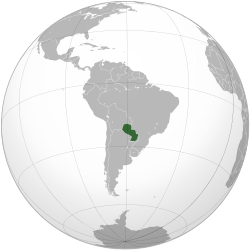Paraguay
Republic of Paraguay | |
|---|---|
| Motto: "Paz y justicia" (Spanish) "Peace and justice" | |
| Anthem: Paraguayos, República o Muerte (Spanish) Paraguayans, Republic or Death | |
 Location of Paraguay (dark green) in South America (grey) | |
| Capital and largest city | Asunción 25°16′S 57°40′W / 25.267°S 57.667°W |
| Official language[1][2] | |
| Ethnic groups (2016[3]) |
|
| Demonym(s) | Paraguayan |
| Government | Unitary presidential constitutional republic |
| Mario Abdo Benítez | |
| Hugo Velázquez Moreno | |
| Legislature | Congress |
| Senate | |
| Chamber of Deputies | |
| Independence from Spain | |
• Declared | 14 May 1811 |
• Recognized | 25 November 1842 |
| Area | |
• Total | 406,752 km2 (157,048 sq mi) (59th) |
• Water (%) | 2.3 |
| Population | |
• 2021 estimate | 6,703,799[4][5] (104th) |
• Density | 17.2/km2 (44.5/sq mi) (204th) |
| GDP (PPP) | 2017 estimate |
• Total | $68.005 billion[6] (100th) |
• Per capita | $9,779[6] (107th) |
| GDP (nominal) | 2017 estimate |
• Total | $28.743 billion[6] (99th) |
• Per capita | $4,133[6] (109th) |
| Gini (2015) | high |
| HDI (2015) | medium · 110th |
| Currency | Guaraní (PYG) |
| Time zone | UTC–4 (PYT) |
• Summer (DST) | UTC–3 (PYST) |
| Driving side | right |
| Calling code | +595 |
| ISO 3166 code | PY |
| Internet TLD | .py |
| |
Paraguay, officially the Republic of Paraguay (Spanish: República del Paraguay), is a small country in South America. It is landlocked, meaning that it is not next to the ocean. It is bordered to the North and East by Brazil, the West by Bolivia, and the South and Southeast by Argentina. The main languages are Spanish and Guaraní. Paraguay's population is about 6 million. The ethnic makeup of the population is the following: Mestizo (mixed European and Amerindian) 80%, European 20%, unmixed Amerindian 1-3%, Asian 1-4%.
Over (20%) of the population lives below the poverty line.
Paraguay has two official languages, Spanish and Guaraní. Guaraní is recognized as a national language.
The capital city is Asuncion. Asuncion was founded in 1537 by a Spaniard named Juan de Salazar. Paraguay was a colony of Spain, but became independent in 1811.
From 1865-1870 Paraguay lost land and most of its male population in the War of the Triple Alliance against Brazil, Argentina, and Uruguay. It gained land in the Chaco War against Bolivia in the 1930s.
Paraguay's main religion is Roman Catholicism.
The weather is humid in the east and dry in the west.
Government and politics
[change | change source]Administrative subdivisions
[change | change source]Paraguay has 17 departments and one capital district (Distrito Capital). The departments are formed by districts.
The departments are grouped in two geographic regions, separated by the Paraguay river:
- Occidental (Western) region or Chaco, to the north of the Paraguay river (departments: Alto Paraguay, Boquerón and Presidente Hayes)
- Oriental (Eastern) region, to the south of the Paraguay river (departments: Alto Paraná, Amambay, Caaguazú, Caazapá, Canindeyú, Central, Concepción, Cordillera, Guairá, Itapúa, Misiones, Paraguarí, San Pedro and Ñeembucú; the capital district is part of this region)
| No. | Department | Capital | Population (2002) |
Area (km²) |
Districts |
|---|---|---|---|---|---|
| 1 | Concepción | Concepción | 179,450 | 18,051 | 8 |
| 2 | San Pedro | San Pedro | 318,698 | 20,002 | 20 |
| 3 | Cordillera | Caacupé | 233,854 | 4,948 | 20 |
| 4 | Guairá | Villarrica | 178,650 | 3,846 | 18 |
| 5 | Caaguazú | Coronel Oviedo | 435,357 | 11,474 | 21 |
| 6 | Caazapá | Caazapá | 139,517 | 9,496 | 10 |
| 7 | Itapúa | Encarnación | 453,692 | 16,525 | 30 |
| 8 | Misiones | San Juan Bautista | 101,783 | 9,556 | 10 |
| 9 | Paraguarí | Paraguarí | 221,932 | 8,705 | 17 |
| 10 | Alto Paraná | Ciudad del Este | 558,672 | 14,895 | 21 |
| 11 | Central | Areguá | 1,362,893 | 2,465 | 19 |
| 12 | Ñeembucú | Pilar | 76,348 | 12,147 | 16 |
| 13 | Amambay | Pedro Juan Caballero | 114,917 | 12,933 | 4 |
| 14 | Canindeyú | Salto del Guairá | 140.137 | 14.667 | 12 |
| 15 | Presidente Hayes | Villa Hayes | 82,493 | 72,907 | 8 |
| 16 | Alto Paraguay | Fuerte Olimpo | 11,587 | 82,349 | 4 |
| 17 | Boquerón | Filadelfia | 41,106 | 91,669 | 3 |
| 18 | Distrito Capital | Asunción | 512,112 | 117 | 6 |
References
[change | change source]- ↑ "Paraguay – Constitution, Article 140 About Languages". International Constitutional Law Project. Retrieved 3 December 2007.
{{cite journal}}: Cite journal requires|journal=(help) (see translator's note) - ↑ "8 LIZCANO" (PDF). Convergencia.uaemex.mx. Archived from the original (PDF) on 15 January 2013. Retrieved 5 October 2012.
- ↑ Central Intelligence Agency (2016). "Paraguay". The World Factbook. Langley, Virginia: Central Intelligence Agency. Archived from the original on November 4, 2015. Retrieved January 1, 2017.
- ↑ "World Population Prospects 2022". population.un.org. United Nations Department of Economic and Social Affairs, Population Division. Retrieved July 17, 2022.
- ↑ "World Population Prospects 2022: Demographic indicators by region, subregion and country, annually for 1950-2100" (XSLX). population.un.org ("Total Population, as of 1 July (thousands)"). United Nations Department of Economic and Social Affairs, Population Division. Retrieved July 17, 2022.
- ↑ 6.0 6.1 6.2 6.3 Paraguay. International Monetary Fund
- ↑ "Gini Index". World Bank. Retrieved 5 December 2017.
- ↑ "2016 Human Development Report" (PDF). United Nations Development Programme. 2016. Retrieved 25 March 2017.
Notes


